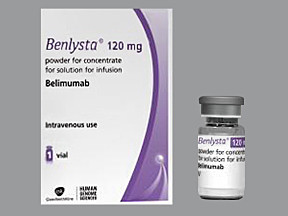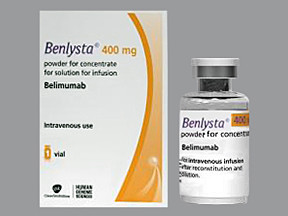BELIMUMAB - INJECTION
PHONETIC PRONUNCIATION: (be-LIM-ue-mab)
COMMON BRAND NAME(S): Benlysta
GENERIC NAME(S): belimumab
Uses
USES: This medication is used to treat a certain type of lupus, systemic lupus erythematosus, in patients who are receiving other lupus medicines. It works by binding to a protein (found in high levels in patients with active lupus) in the blood and limiting the activity of the protein. It helps decrease the symptoms of lupus. Belimumab is a type of medication called a monoclonal antibody.
How to use BELIMUMAB - INJECTION
HOW TO USE: Read the Medication Guide provided by your pharmacist before you start using belimumab and each time you get a treatment. Discuss the risks and benefits of belimumab treatment. If you have any questions, ask your doctor or pharmacist. This medication is given by injection into a vein by a health care professional. It should be injected slowly over 1 hour. The first 3 doses are given every 2 weeks. After the third dose, it is usually given every 4 weeks, or as directed by your doctor. The dosage is based on your weight. Your doctor may prescribe other medications for you to take before the start of your treatment to help prevent serious side effects. This medication may cause very serious reactions during or after treatment. These reactions occur more often during the first and second treatments. Your doctor will monitor you closely. If you have a reaction, your treatment will be temporarily stopped. Tell your doctor or nurse right away if any of these effects occur: headache, slow heartbeat, muscle pain, dizziness/fainting, nausea, or rash/itching. Use this medication regularly to get the most benefit from it. It may help to mark your calendar with a reminder. Tell your doctor if your condition does not improve or if it worsens.
Side Effects
Precautions
Interactions
Overdose
Images
Reviews
Faq for BELIMUMAB - INJECTION
Belimumab injection is used to treat systemic lupus erythematosus (SLE) in patients who are receiving standard therapy.
Belimumab injection works by targeting and inhibiting a specific protein called B-lymphocyte stimulator (BLyS). By suppressing BLyS, it reduces the overactivity of B cells in the immune system, which is believed to contribute to the development and progression of SLE.
The common side effects of belimumab injection may include nausea, diarrhea, fever, muscle or joint pain, headache, increased infections, and infusion reactions. It is important to consult a healthcare professional for a complete list of side effects.
Belimumab injection is administered as an intravenous (IV) infusion by a healthcare professional. The dosage and frequency of administration will depend on the individual patient's condition and response to treatment.
There is limited data on the use of belimumab injection during pregnancy. It is recommended to discuss with a healthcare professional if pregnancy is planned or suspected before initiating treatment with belimumab.
The effectiveness of belimumab injection may vary from individual to individual. Some patients may start experiencing symptom improvement within a few weeks, while others may require several months of treatment. It is important to follow the prescribed treatment regimen and have regular check-ups with a healthcare professional to monitor progress.
Belimumab injection is approved for use in adults with systemic lupus erythematosus. Its safety and efficacy in pediatric patients have not been established, and therefore it is not recommended for use in children.
There are no known major drug interactions with belimumab injection. However, it is always important to inform your healthcare provider about all the medications, vitamins, and herbal supplements you are taking to avoid any potential interactions or complications.
The duration of treatment with belimumab injection will depend on the individual patient's response and the severity of their condition. In some cases, long-term or lifelong treatment may be necessary to manage systemic lupus erythematosus effectively.
Disclaimer
IMPORTANT: HOW TO USE THIS INFORMATION: This is a summary and does NOT have all possible information about this product. This information does not assure that this product is safe, effective, or appropriate for you. This information is not individual medical advice and does not substitute for the advice of your health care professional. Always ask your health care professional for complete information about this product and your specific health needs.


No Reviews Yet